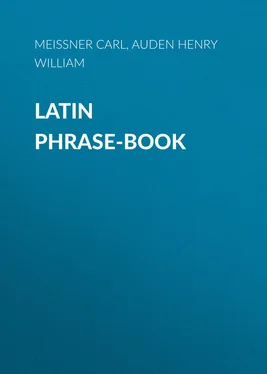Carl Meissner - Latin Phrase-Book
Здесь есть возможность читать онлайн «Carl Meissner - Latin Phrase-Book» — ознакомительный отрывок электронной книги совершенно бесплатно, а после прочтения отрывка купить полную версию. В некоторых случаях можно слушать аудио, скачать через торрент в формате fb2 и присутствует краткое содержание. Жанр: foreign_antique, foreign_prose, на латинском языке. Описание произведения, (предисловие) а так же отзывы посетителей доступны на портале библиотеки ЛибКат.
- Название:Latin Phrase-Book
- Автор:
- Жанр:
- Год:неизвестен
- ISBN:нет данных
- Рейтинг книги:5 / 5. Голосов: 1
-
Избранное:Добавить в избранное
- Отзывы:
-
Ваша оценка:
- 100
- 1
- 2
- 3
- 4
- 5
Latin Phrase-Book: краткое содержание, описание и аннотация
Предлагаем к чтению аннотацию, описание, краткое содержание или предисловие (зависит от того, что написал сам автор книги «Latin Phrase-Book»). Если вы не нашли необходимую информацию о книге — напишите в комментариях, мы постараемся отыскать её.
Latin Phrase-Book — читать онлайн ознакомительный отрывок
Ниже представлен текст книги, разбитый по страницам. Система сохранения места последней прочитанной страницы, позволяет с удобством читать онлайн бесплатно книгу «Latin Phrase-Book», без необходимости каждый раз заново искать на чём Вы остановились. Поставьте закладку, и сможете в любой момент перейти на страницу, на которой закончили чтение.
Интервал:
Закладка:
29
antiquitas = the state of affairs in times gone by, not a division of time; so antiquitatis studia , archaeology; veteres or antiqui poetae, populi , the poets, people of antiquity; antiqua monumenta , the relics of antiquity. antiquitates plur. is used for the institutions, usages of times gone by.
30
momentum (i.e. movimentum ) is properly that which sets in motion, which gives a decisive impulse to things, cf. Luc. iv. 819, momentumque fuit mutatus Curio rerum . Livy and later writers employ the word in the sense of a moment of time.
31
ad tempus also means (1) according to the circumstances of the case, e.g. ad tempus consilium capere , (2) for a short time, temporarily.
32
The spirit of a thing is usually rendered by such words as natura, proprietas, ratio atque voluntas , e.g. the spirit, genius of a language, natura or proprietas sermonis ; the spirit of the laws, voluntas et sententia legum .
33
Unless one is emphasised unus is left out with the following words: annus, mensis, dies, hora , and verbum .
34
Used absolutely "too late" = sero ; if "too late for," "later than," always serius (quam) .
35
caput has several metaphorical meanings, e.g. capita coniurationis (Liv. 9. 26), the leaders of the conspiracy; caput Graeciae , the capital of Greece; caput cenae , the chief dish; capita legis , the headings, clauses of a law; id quod caput est , the main point; de capite deducere (Liv. 6. 15), to subtract from the capital; capitis periculum , mortal peril; capitis deminutio ( maxima, media, minima ) (Liv. 22. 60), deprivation of civil rights. caput is often combined with fons = source, origin, e.g. ille fons et caput Socrates (Cic. De. Or. 1. 42); in aegritudine est fons miseriarum et caput (Cic.) By metonymy caput is used with liberum (and noxium ) (Verr. 2. 32. 79) with the meaning of a free (guilty) person, individual.
36
Cf. velut in cervicibus habere hostem (Liv. 44. 39); bellum ingens in cervicibus est (Liv. 22. 33. 6).
37
Cf. ne digitum quidem porrigere alicuius rei causa .
38
Notice too liberos de parentum complexu avellere (Verr. 2. 1. 3. 7), to snatch children from their parents' "arms" (not brachium ), so in alicuius complexu mori ; in alicuius complexu haerere . medium aliquem amplecti , to take to one's arms, embrace; libentissimo animo accipere , to welcome with open arms.
39
Distinguish effugere aliquid , to escape the touch of, e.g. invidiam, mortem ; and effugere ex aliqua re , to escape from a position one is already in, e.g. e carcere, e caede, e praelio . Notice fugit me , it escapes my notice.
40
animum advertere aliquid = animadvertere aliquid = to notice a thing; animadvertere in aliquem = to punish a person.
41
To shut one's eyes to a thing, conivere in aliqua re .
42
Cf. caecatus, occaecatus cupiditate, stultitia .
43
pro virili parte is distinct from the other expressions, as implying more assurance and confidence on the part of the speaker.
44
It was the custom for a Roman father to lift up his new-born child, which was laid on the ground at his feet; hence the expression tollere, suscipere .
45
suppeditare (1) transitive, to supply sufficiently; (2) intrans. to be present in sufficient quantities = suppetere .
46
vitae (vivendi) cursus or curriculum = life, career – considering its duration, length. Life = biography is not curriculum vitae , but simply vita, vitae descriptio .
47
To live, speaking chronologically, is esse ; vivere denotes to be alive, pass one's life, e.g. laute, in otio .
48
sitis is also used metaphorically – e.g. libertatis sitis (Rep. 1. 43. 66), so sitire – e.g. honores (De Fin. 4. 5. 3), libertatem (Rep. 1. 43. 66), sanguinem (Phil. 2. 7. 20). The participle sitiens takes the Gen. – e.g. sitiens virtutis (Planc. 5. 13).
49
Not in risum erumpere , which only occurs in late Latin. However, risus, vox, fletus erumpit is classical, similarly indignatio (Liv. 4. 50), furor, cupiditates (Cael. 12. 28).
50
valetudo is a neutral term = state of health. sanitas = soundness of mind, reason – e.g. ad sanitatem reverti , to recover one's reason.
51
Note auribus, oculis, captum esse , to be deaf, blind; mente captum esse , to be mad.
52
The comparative and superlative of aeger and aegrotus are not used in this connection, they are replaced by such phrases as vehementer, graviter aegrotare, morbus ingravescit , etc.
53
But se excusare alicui or apud aliquem ( de or in aliqua re ) = to excuse oneself to some one about a thing.
54
sua morte defungi or mori is late Latin, cf. Inscr. Orell. 3453, debitum naturae persolvit .
55
se interficere, se occidere, se necare are rare. During the classic period, when suicide was not common, ipse is often added – e.g. Crassum se ipsum interemisse (Cic. Scaur. 2. 16), Lucretia se ipsa interemit (Fin. 2. 20. 66); but later, when suicide had become frequent, se interemit; nonnulli semet interemerunt (Suet. Iul. 89), etc., occur commonly.
56
"Corpse" usually = corpus mortui or simply corpus . cadaver is a corpse which has begun to decompose.
57
For eulogy, panegyric, use laudatio funebris or simply laudatio , cf. Mil. 13. 33; Liv. 5. 50.
58
incunabula literally swaddling-clothes. cunabula , cradle, is not used in this metaphorical sense except in post-Augustan Latin.
59
Notice the order; so regularly ea and qua de causa ; but ob eam causam not eam ob causam . For the meaning of iustus cf. xvi. 5 bellum iustum and xvi. 10a praelium iustum .
60
But respicere ad aliquid (aliquem) = to look round at an object.
61
contineri aliqua re also means (1) to be bounded by… e.g. oceano ; (2) to be limited, restricted to, e.g. moenibus .
62
The proper meaning of integer ( in-TAG, tango ) is untouched, unsullied.
Читать дальшеИнтервал:
Закладка:
Похожие книги на «Latin Phrase-Book»
Представляем Вашему вниманию похожие книги на «Latin Phrase-Book» списком для выбора. Мы отобрали схожую по названию и смыслу литературу в надежде предоставить читателям больше вариантов отыскать новые, интересные, ещё непрочитанные произведения.
Обсуждение, отзывы о книге «Latin Phrase-Book» и просто собственные мнения читателей. Оставьте ваши комментарии, напишите, что Вы думаете о произведении, его смысле или главных героях. Укажите что конкретно понравилось, а что нет, и почему Вы так считаете.

![Рис Хьюз - Madonna Park[e-book - рассказы]](/books/94285/ris-hyuz-madonna-park-e-book-rasskazy-thumb.webp)










